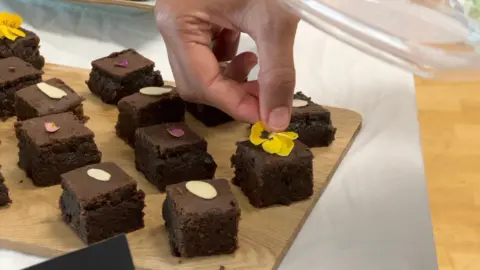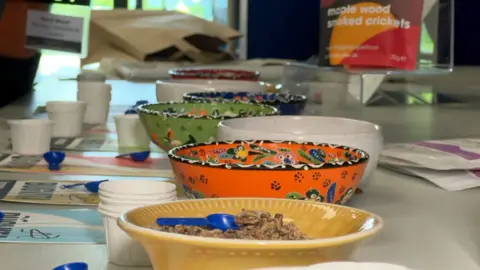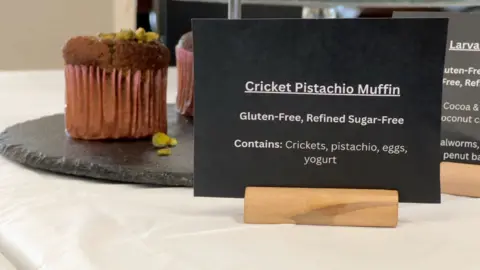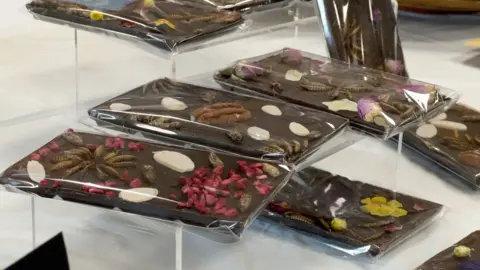Are 'nutritious' edible bugs a future food source?
 BBC
BBCCarefully displayed on a wooden tray and decorated with petals, these gluten-free and dairy-free chocolate brownies contain an unexpected ingredient.
They were baked using flour made from ground up crickets.
The brownies were one of a number of items showcased at a conference about farmed insect protein at the University of Nottingham's Sutton Bonnington campus last month.
Part of the aim of the event, held in partnership with the UK Edible Insect Association (UKEIA), was to bring the industry and regulators together to discuss the "potential" of insect protein as an alternative sustainable food option.
"Insects are incredibly nutritious," said Nick Rousseau, managing director of the UKEIA.
"They have high protein levels and people all around the world eat them on a regular basis as part of their traditional diet.
"Insect farming is not harvesting from the wild, it's farming them in a way that is good for the insects and creates a really sustainable product."

According to the Food Standards Agency, yellow mealworm, house cricket, banded cricket and black soldier fly are the only edible insects allowed to be sold in Great Britain.
They are considered a "novel food", which means they need to undergo pre-market assessments before they can be legally placed on the market.
A variety of insect-based snacks were on offer at the conference, held on 24 and 25 April, including flavoured crickets, roasted mealworms and protein bars made using cricket flour.
Peak District farmer Marshall Waller, who is concerned that traditional farming will not be able to keep pace with a growing population, tried insect protein for the first time.
"I think the thought of it is worse than the actual taste," he said.
"If you didn't know it was insects, you wouldn't know they were there.
"We're concerned about environmental impacts of traditional farming, so we're just looking at more sustainable ways of producing our food."

Tim Parr, professor of nutritional biochemistry at the University of Nottingham, believes insects could provide the answer to food shortages.
"We're looking at different types of organisms or plants that could be used as a food source that may make up the shortfall for what we know is likely to be a crisis associated with food availability, particularly with protein," he explained.
"We're looking at how they grow, what yields we can get from them and how big they can grow or what conditions they can grow under."
But Nahla Mahmoud, founder of The Insect Cafe in Edinburgh, believes there is a stigma associated with eating insects.
"At the moment and in our main UK culture, insects are associated with either places we don't want to be in, unhygienic settings or survival," she said.
"A lot of people watch I'm A Celebrity... Get Me Out Of Here and that's the image that comes, a live insect that you're forced to eat."

Ms Mahmoud, who said she started eating insect-based food six years ago, believes edible bugs "can be used in so many different forms and ways in our everyday food".
"They're such a versatile and beautiful product," she said.
"A spoonful of ground-up insects is eight grams of protein. Imagine adding that to your porridge in the morning or into your smoothie or into a soup.
"It adds more nutritional value."
Insects are also being used to produce pet food, with advocates saying they provide a more environmentally-friendly alternative to traditional animal food.
And, in recent years, companies have looked at Artificial Intelligence to help lower the costs of insect farming.
Mr Rousseau is excited about what the future holds for the sector and said: "We're now in a situation in the modern world where we need more sustainable options and, what we're seeing, is the development of insect farming."
Follow BBC Derby on Facebook, on X, or on Instagram. Send your story ideas to [email protected] or via WhatsApp on 0808 100 2210.
